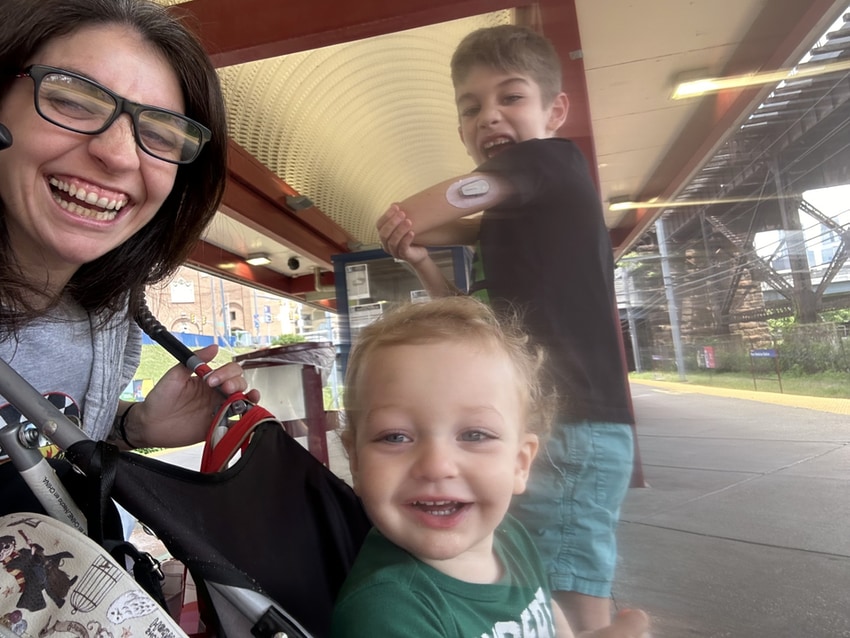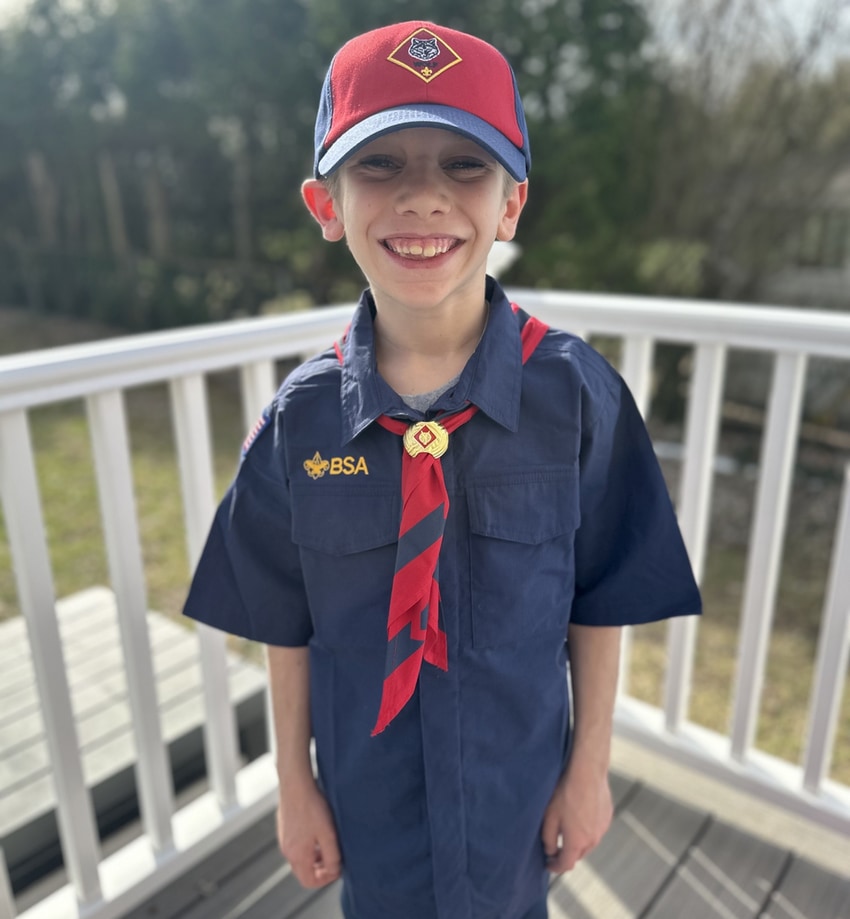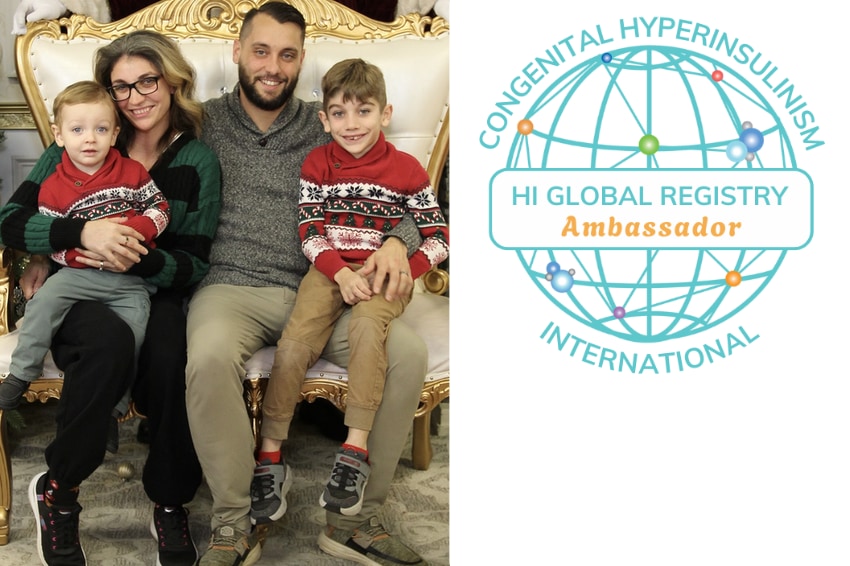Ricky is an energetic, larger than life 8-year-old who loves Boy Scouts, Minecraft, gaming, building, music, and most importantly, being a big brother to his brother Michael. He is the most empathetic person you will ever meet, constantly trying to help and put a smile on your face, especially when he realizes you could use one. His hilarious antics and witty comebacks have led to the legendary “Rickyisms,” a hashtag his mom uses on Facebook to give the audience humor in their everyday lives. He has the most positive look on the world, commonly saying “This is the best day ever” simply when he’s enjoying himself. This infectious happiness, and his strength in the medical world, has given him the apt and emblematic nickname “Superman.”
Diagnosis
Ricky was born two weeks early, with a large birthweight. Due to this factor, a single nurse recommended additional testing that included a glucose check, which is not a typical test done on newborns. Ricky’s very first blood sugar check was a very low, very dangerous 12 mg/dL and he was almost immediately monitored. The birth hospital, unaware of the true severity of this number, attempted to feed Ricky quickly to bring the numbers up. However, roughly 16 hours later, Ricky was moved to the NICU and placed on dextrose. The next week was full of unknowns for us: we had no idea what was wrong with him, we didn’t know what any of these numbers even meant, and we had no idea when we could take him home. With all of these questions, eventually I began staying overnight at the NICU, sleeping in a chair. Ricky was fasted a couple times, as is required by Children’s Hospital of Philadelphia (CHOP), which he failed. This first exposure to fasting was a heavy trauma for everyone involved, including the NICU nurses that had no idea why they couldn’t feed a newborn baby for six hours at a time.
The failed fasts meant there were still absolutely no answers, and his birth hospital eventually chose to transport him to CHOP, where he could receive more advanced treatment.
Upon arrival, CHOP immediately began diazoxide to see how Ricky would respond. This procedure also led to the first time we heard the strangest diagnosis: “He has congenital hyperinsulinism.” My first response? “Say that again?” Once he began responding to the medication, the rest of another week was spent monitoring its effectiveness, and he was also placed on a water retention medication to combat some of diazoxide’s hardest side effects. CHOP also took an extensive amount of time to keep everyone comfortable and as happy as possible, which included a first-time visit from Sesame Street’s Abby Cadabby, which added an extra layer of comfort to a family struggling to enter an entirely new life. CHOP remains a foundation for every single one of Ricky’s medical conditions. His treatment team was eventually fully constructed when he was seven years old, and it’s made our lives significantly better ever since.
Genetics
We all have given a couple types of DNA samples over the years since his diagnosis, but so far none have confirmed a positive match. We know he has it, we know it’s genetic, we don’t know from whom, and we don’t know what type. It leaves a lot of open doors: we’re unsure of when he will officially “grow out” of his hyperinsulinism, he has no trends. We just know he inherited it.
Managing HI
Over the course of the first couple years of his life, Ricky’s diazoxide dosage was frequently readjusted as he roller-coastered through his hyperinsulinism. In time we landed on a specific twice-a-day regimen that rarely needed any tweaking. He has been steady on the same dose for roughly five to six years now. However, we have established that any current challenge to his condition by lowering this medication to any amount, even .1 mL, will result in more of those steeper, random drops. He passes all safety fasts done every two years, where he fasts overnight for 10 hours without his blood sugar dropping below 70mg /dL. But he is currently in a state of limbo. His medication works, and he is tested at least twice daily using a glucose meter. His meter goes with him anywhere he stays overnight. Testing increases when he is sick or we see any low numbers, which are thankfully few and far between. We also keep glucose gel and tablets nearby, and baqsimi (emergency glucagon) for if he crashes too severely.

He’s almost asymptomatic when dropping below a safe threshold, and even more dangerous numbers usually lead to just simple hand trembles or exhaustion, no other indications that he is crashing. Ricky has had to be extremely in tune with his body and usually picks up on slight cues when needed. As he ages, he has done better and better by recognizing his very minor symptoms. We’ve discovered that he’s been very low on more than one occasion based solely on his own concerns.
We are also unsure of the association of HI with any of his other conditions. Ricky was diagnosed with ADHD when he was three, reclassified as severe ADHD when he was six, reclassified as ADHD bordering autism when he was seven, and has been assessed for autism twice, the second of which we are awaiting the results with bated breath. We continue to not only establish all diagnoses that make up our Superman but also work tirelessly with his care team at CHOP and his IEP team at school to establish how all of this may or may not be connected. Over time we have been able to come to only several conclusions about Ricky: he’s a complicated guy, and we’ve never seen anyone like him. We’ve added more doctors, therapists, and case managers to his team in the last year just to get a clearer picture of everything going on with him.
He’s also participated in two studies thus far: one for neurocognitive development in children with hyperinsulinism, and one for a drug trial. Ricky has a strong desire to participate in medical trials to “help as many people as possible”, but the symptoms of his neurocognitive state, plus PTSD from his medical history, make it difficult for him to confidently and calmly accomplish them. Regardless, even though many of Ricky’s HI symptoms have lightened over the years, his determination to participate in these trials only adds more truth to his nickname-Superman. He keeps showing up with strength and heart, always thinking of others. We couldn’t be more proud of him.
Triumphs and Challenges
Ricky’s moments of triumph have come in small, but meaningful ways. His water retention medication was only needed for the first couple of years of his life, and as he gets bigger his side effects from diazoxide are more easily managed, apart from his very thick hair. However, he gets a LOT of compliments on it, and it is his aunt’s favorite thing to work with as his personal hairdresser.
As previously mentioned, he passes all safety fasts and has needed no dosage increase in several years. The last time he even used emergency glucagon was when he was two. He only requires two blood checks a day, and has been proudly attempting to do them himself, despite a strong fear of needles.
The completion of his first medical trial was no easy feat either. His extreme fear of needles meant placing a Dexcom for the first time was beyond challenging, and the trial itself was a stressful period. So, when he finished it, we celebrated. He wrapped it up about a month and a half prior to his eighth birthday, and we threw him a party at a retro arcade to honor his accomplishments in one remarkable year.
Our biggest challenges involve Ricky’s mental health. His ADHD diagnosis, issues with PTSD from difficult hospital stays, and a multitude of other symptoms from disorders we’re not entirely sure of yet mean he can be a lot to handle. He is extremely high energy, extremely reactive to his environment and the moods of others, easily distracted and lost in his own very elaborate imagination. His strong empathy also means he views others differently and struggles to accept that not everyone can be as kind as he is. We deal with most, if not all of these symptoms on a daily basis. It is what takes up most of our time both with patience and doctor’s appointments. It also means we have difficulty constructing an education plan that benefits him in the best ways possible, so his school team is consistently meeting to try and figure out what to do next. As a result, both his care and school teams have begun more open communication. At present, Ricky sees an endocrinologist, an ADHD psychologist, a psychiatrist, a neuropsychologist, and an autism specialist, all from CHOP, while at school he receives services for speech, occupational therapy for his hands and coordination, social skills classes to help build friendships, emotional regulation classes, spends 30 minutes a day in a more closely monitored classroom, and has a one-on-one during his general education time. As we navigate this road with him, however, we are so grateful for his contagiously positive outlook. We are so lucky to have a son like Ricky, and we wouldn’t trade him for the world.
Looking Towards the Future
At this point our number one goal has become improving Ricky’s mental health. But a close second is establishing a connection between executive dysfunction and HI. Our advocacy has not only led us to a wonderful team of doctors for our son, but an amazing community with parents and caretakers who very often struggle with diverse mental needs like Ricky. It’s becoming increasingly obvious that, somehow, every single one of Ricky’s current and possible future disorders circles right back to his hyperinsulinism, and at this point we fully encourage researchers to investigate this theory. It is why we were more than happy to participate in CHOP’s neurocognitive study, and we’re more than prepared to become active in more as this issue gains more attention. A lot of these studies can be done with the Hyperinsulinism Global Registry (HIGR), a database people with HI and their parents or caregivers can use to fill out surveys about life with HI and directly upload glucose numbers, making it easier for medical professionals to collect “real time data” from kids who struggle with this every day. As a HIGR ambassador, I can’t promote its use enough. Ricky’s surveys are full of explanation on his struggles, and his glucometer readings always upload to HIGR with barely any effort. It’s work like this that helps us find the answers we’ve long been looking for. Hopefully, with the collection of data and parent stories, we will know more. Maybe then Ricky can have a different answer than “I don’t know.”
Go back to the HI-Stories page and see more profiles.



